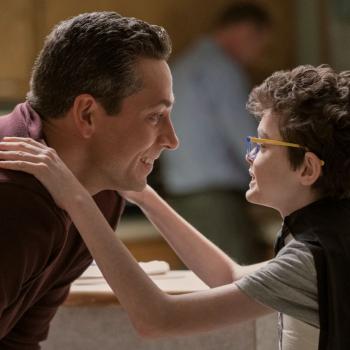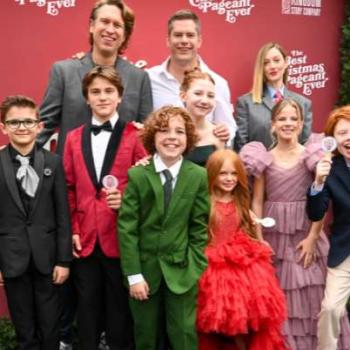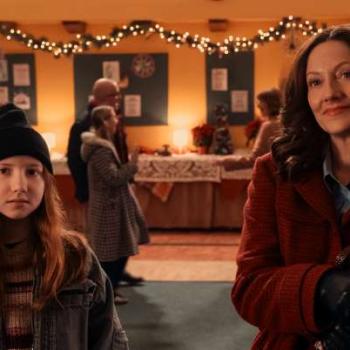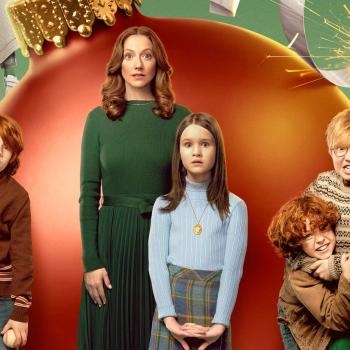In the new indie thriller “The Quarry” starring Michael Shannon and Shea Wingham, and directed by Scott Teems, a mysterious traveler with a shady past assumes the identity of a pastor. The film, co-written by Teems with Andrew Brotzman and based on a 1995 novel by Damon Galgut, touches on themes of race, religion, and community and releases this week on digital outlets.

Teems, who previously directed “The Evening Sun,” recently spoke to Reel Faith about how his faith informs his writing and leaving questions unanswered for audiences.
When did you become familiar with the original novel and decide this would be your next project?
Yeah, I know 10 years ago, I had just made another film called “The Evening Sun,” which was my first film and I was looking for the next project. I read the synopsis or the blurb about this book somewhere online and was just immediately grabbed by the hook. It combines both the current sort of the classic premise of the stranger who rolls into town, switched identities and all these ideas that grabbed me. It also dealt with themes that have always intrigued me as a storyteller, namely men violence, religion, and where those ideas come together, intersect, collide. So I read the book. It was written in 95 in post-apartheid South Africa, about racial injustice in this small township. But I immediately saw correlations to the United States in sort of our own racial conflicts and strife, which, you know, ten years ago was bad. And in the 10 years, since, obviously, it’s only gotten worse and become more relevant. The book was sort of set coastal plains of South Africa that intrigued me, and I saw the plains of Texas in my mind. It seemed like a natural translation when you have an idea like that it’s so pure, like the sort of central hook— stranger rolls into town taking someone’s identity—that that’s an idea that can be transferred between different locations and they’ll use. So I set off on this 10-year journey to try to make the movie.
When this stranger becomes the pastor, the congregation really connects with him, even though he’s not pastor material. Why do you think that is?
I’ll say as a caveat for all of this is that my hope is that’s the question you ask as a viewer. This is not me being coy, but I feel like the reason I’m telling the story is that so you will go, “Hmm, that’s peculiar. What is that about?” And you’ll lean in and you’ll think about it. You’ll have that question yourself. Now, if I sit here and tell you, “Well, that’s because this, this and this,” I feel like it does a disservice to the movie. I know people don’t like that answer sometimes. But I do think, for me, honestly, it is the point and the same thing with the whole movie and all the questions. I really feel that’s our job as storytellers to ask questions. I have no interest in giving you any answers in the same way that I’m not interested in your answers. I’ll say this is a great quote I read one time. Unfortunately, I don’t know who to attribute it to. But it said something, I’m paraphrasing, but “The problem with many Christian writers is that they give you the answer before they give you the question.” And that is really something that struck me early on in my life as a person of faith who wanted to tell stories and wrestle with these bigger questions. that resonated with me. And because it’s true to my life experience. I didn’t stumble on to it. I guess I didn’t have my faith experience because someone told me it was the right thing to do. I had to have a personal experience that changed me. But people asked me questions. People provoked me. So there are questions, like “Does that matter? Why does that matter? Should that matter? Should I care about this? This forgiveness? Does it matter? Who cares?”
Did the original novel center on a church and preacher as the identify or was that something you explored?
No, he was definitely he assumed the preacher role, the pastor role. So the basics of the book are all the same in terms of plot. And I think it’s just a matter of Damon Galgut. He was more interested in the cycle of violence, man against man, man’s inclination toward violence, which, of course, I’m interested in as well, which is there. I think he was more interested in that than the religious aspects of it. I think that I think religion was more of a device to create a scenario in which these things would play out. He was interested to a certain degree, but I just think for me, it felt like that was where my personal interest and experience was. So, I leaned more into that and explored it a little more. But the basic beats of the story are all there and I just took it from him.
What are the challenges of directing a film from a screenplay you cowrote?
I think it’s a gift because I think that when you know the screenplay, so intimately because you wrote it, then it allows you the information you need to make those hard decisions. We shot this movie in 21 days. We had to cut scenes while we were shooting. We had to make really hard decisions on the fly because there simply wasn’t enough time. So, when you are the writer, then it allows you that knowledge to really know how all the pieces fit together. And if I take this scene out, or if I cut this bit, what does it do to the whole because you know it so intimately, especially as I had lived with it for ten years, so I knew the story inside and out, with Andrew Brockman who wrote it with me. He was there on set some of the time and I was able to consult him as well. We had these conversations and we rewrote stuff. When you’re a writer, you can this allows you then to be able to make those changes a little more confidently, because, you know, you know how all the pieces fit in the macro sense in your mind.
It’s a movie with heavy themes. What was it like on set? Heavy or was the mood lighter?
You try to make it fun but when you’re on a low budget film with a very compressed schedule, things are pretty serious. The good news is that we had great friendships on this set to help anchor us. Shae and Mike are old friends and they were brought together for this film through Kristin Mann, one of our producers and they’re all old friends. And that camaraderie and trust, it creates a mood on set, a tone that’s one of camaraderie and that’s important because you’re pulling for each other. When you see your two lead actors who really love each other, respect each other and show up for each other, bringing their A-game every time, that sets the tone for everyone else and everyone all the other actors and the crew. The director also sets that tone. And I’m just trying my best to make everyone feel appreciated. And things get tense, often because we’re running and gunning, and there’s a lot to do and not enough time to do it But I just want people to know they’re appreciated, and how grateful I am that they’re, they’re working hard for getting less money than they could be on some other show to come work on a show that we all think has real value and purpose and has something to say about the world. That’s what’s important for us.
You mentioned earlier about your faith background, and I didn’t know if you know if you’re comfortable sharing a little bit about that and how it influences the projects that you work on.
I grew up in Georgia. In the south, religion is baked into your being and as I got older. That was the case for me, certainly, I grew up Methodist. As I got older and became a teenager in high school, college, you began to wrestle with what that means to you and your relationship to faith and religion. That’s a journey that I’ve been on my whole life. And I’m just really grateful for the opportunity to tell these kinds of stories that do ask bigger questions and wrestle with these ideas because those are the questions that matter to me. For me, you know, it’s a lifelong journey that I’m interested in never, never figuring it out. Because if God is real, you’re not going to be able to figure it out. So, in all of it, I’m certainly interested in asking those questions and being open to learning every day. That’s my goal is and that requires humility, and that’s never been my strong suit. So, I’m working hard on that every day and trying to hold everything with loose fingers and being open to surprise and revelation. That’s my goal.
“The Quarry,” releasing from Lionsgate, is available for purchase and rental starting Friday, April 17.












